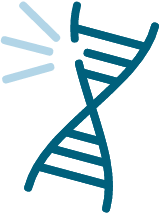ATTR-CM, or transthyretin cardiac amyloidosis, is a heart condition that often goes unnoticed and gets worse over time
- ATTR-CM happens when a protein called transthyretin (TTR) breaks down and turns into amyloid. Amyloid can build up in the heart making it harder for the heart to pump effectively
- The amyloid can also build up in other parts of the body. This can result in worsening symptoms and other potential problems like:
- carpal tunnel syndrome
- lower back pain
- stomach issues
- strange tingling or pain in toes or feet

Your liver produces transthyretin (TTR). TTR is a protein that carries a hormone and vitamin A throughout the bloodstream.

When you have transthyretin amyloid cardiomyopathy (ATTR-CM), the TTR protein becomes unstable and misfolds.

Over time, the misfolded proteins build up in the heart. This can cause the muscles in the heart to get thick and stiff, which can lead to heart failure.
Early diagnosis is important. Create a custom discussion guide to talk to your doctor
Wild-type ATTR-CM (wtATTR)
- Wild-type ATTR-CM (wtATTR) occurs when the transthyretin (TTR) protein becomes unstable with age and misfolds
Hereditary ATTR-CM (hATTR)
- Hereditary ATTR-CM (hATTR) is caused by a change, or mutation, in the TTR gene passed down from a relative
- The most common mutations associated with hATTR in the US are V122l (found almost exclusively in Black Americans) and T60A (found in those of Irish descent)
“Once I learned that VYNDAMAX can help to slow the progression of ATTR-CM, I was eager to begin the treatment journey.”
“Once I learned that VYNDAMAX can help to slow the progression of ATTR-CM, I was eager to begin the treatment journey.”
![]()
The sooner you are diagnosed with ATTR-CM, the sooner you can discuss a treatment plan with your doctor
Tips if you’re newly diagnosed with ATTR-CM:
- Understand that ATTR-CM is a rare, life-threatening, progressive heart condition, which means it will get worse over time
- Discuss treatment options with your doctor as soon as your diagnosis is confirmed. The sooner you start treatment, the sooner you can begin to slow disease progression
- It can be helpful to connect with other people diagnosed with ATTR-CM
If you’ve been diagnosed with hereditary ATTR-CM, your loved ones may also be at risk.
It’s important for patients with hereditary ATTR-CM to tell their families about their condition. This allows family members to make a decision as to whether they want to pursue genetic testing and counseling.
Genetic testing will help confirm or rule out the hereditary form of ATTR-CM and may help identify family members who are at risk. Genetic testing is typically performed using blood or saliva samples.
Genetic counseling may be available to help those diagnosed with hereditary ATTR-CM (and their families) to understand test results and potential next steps.








